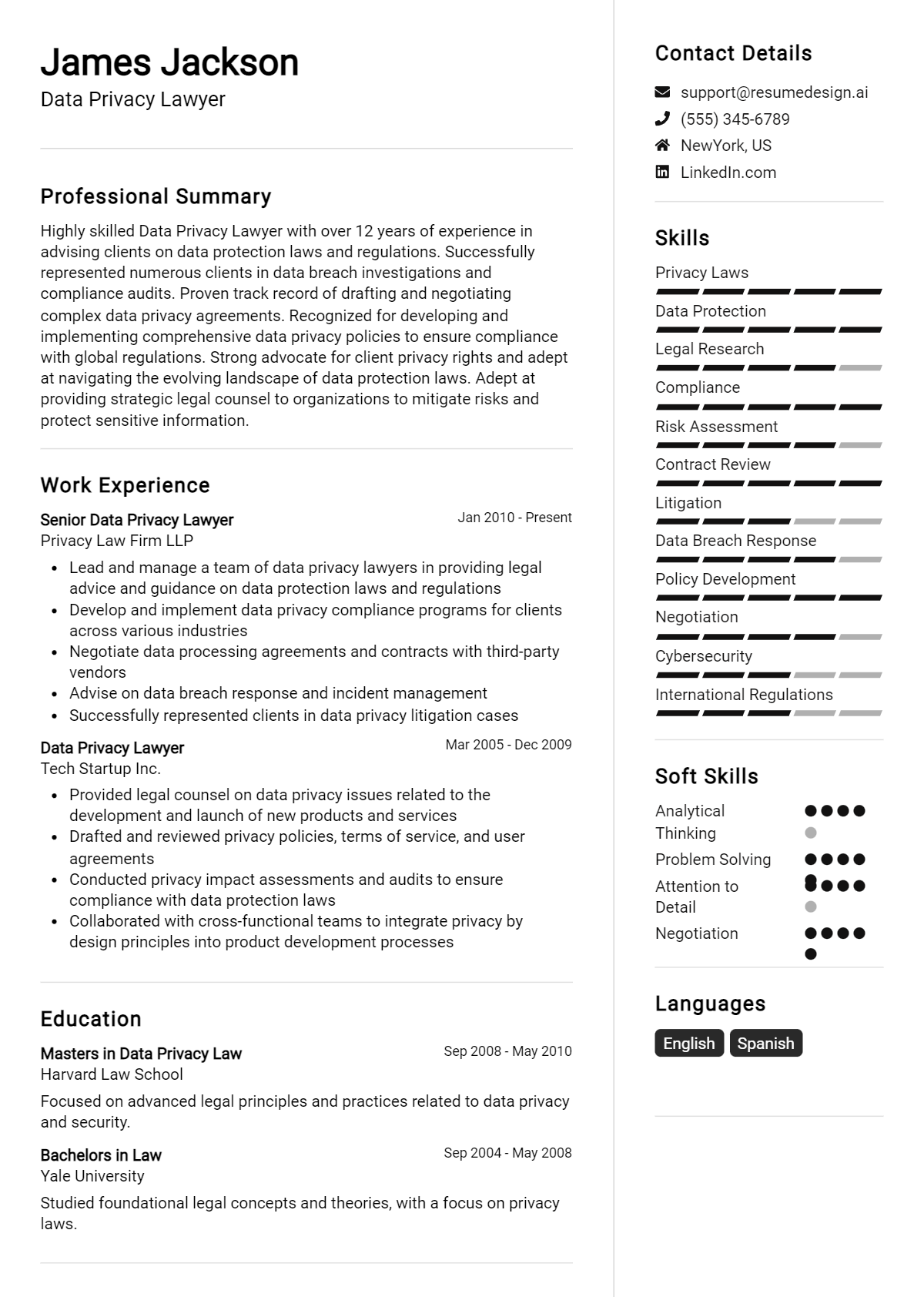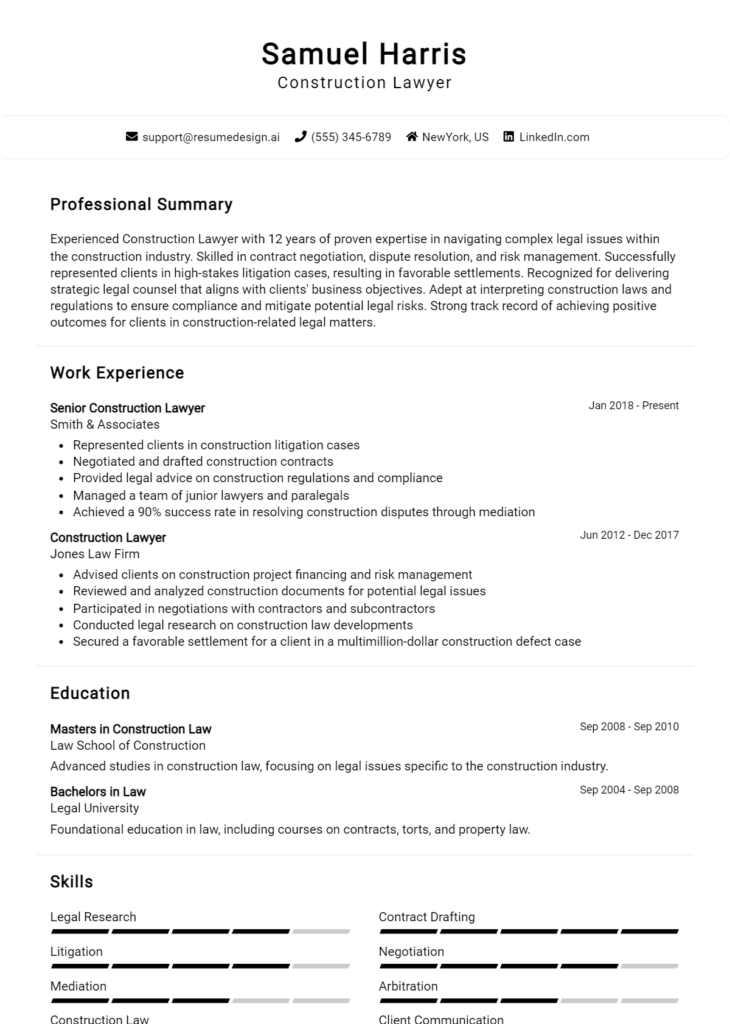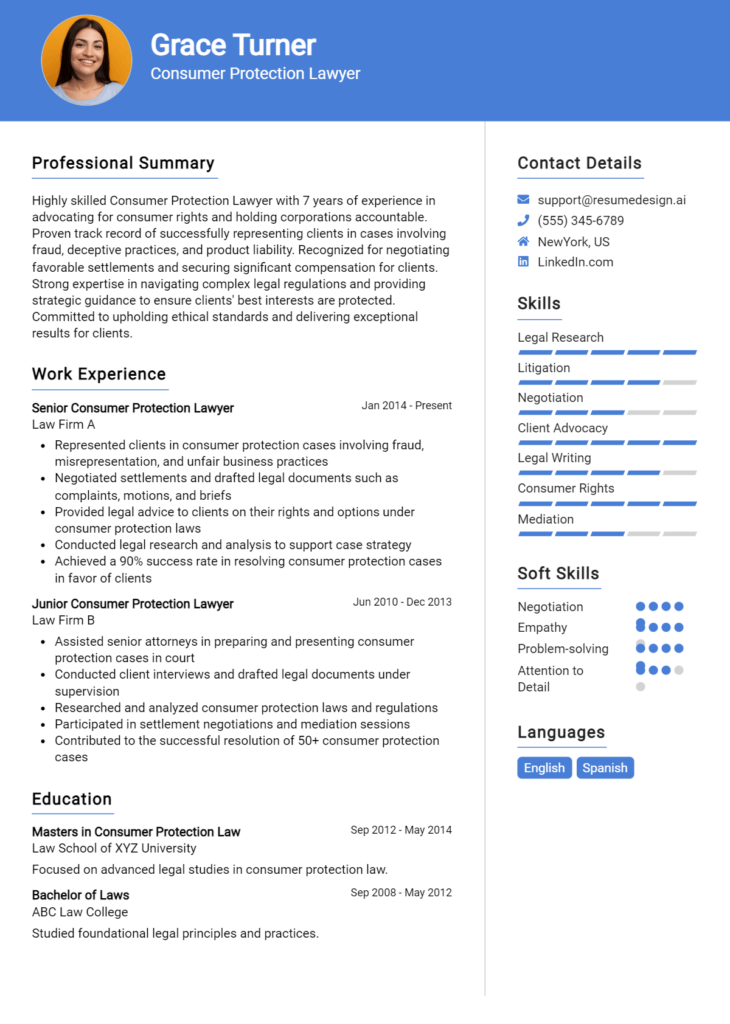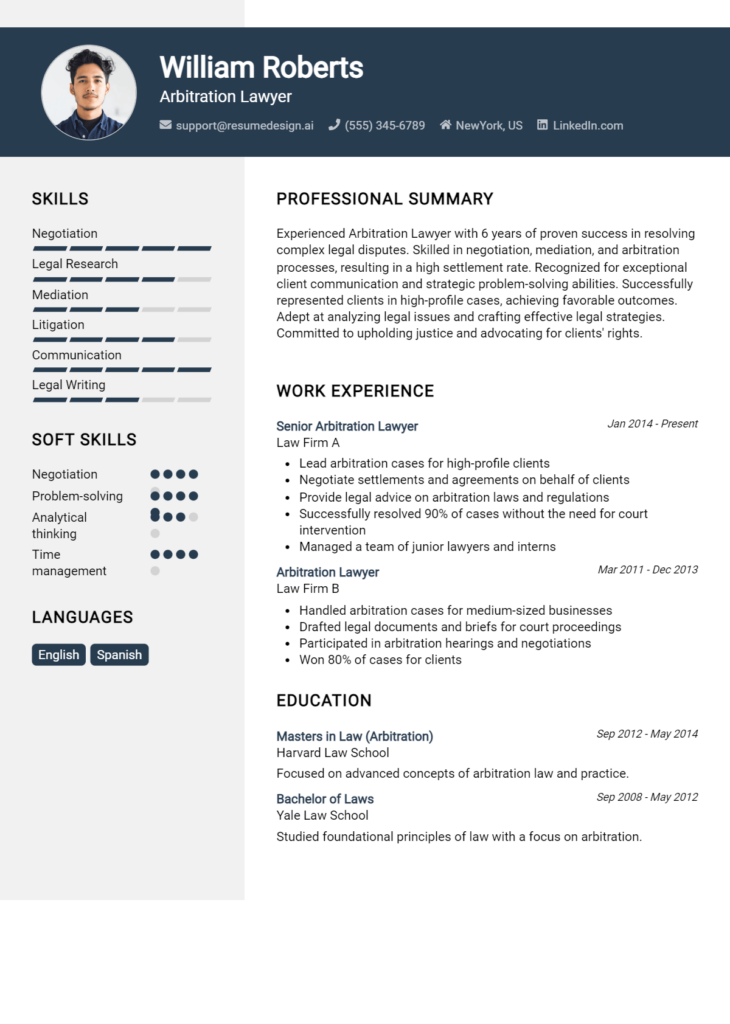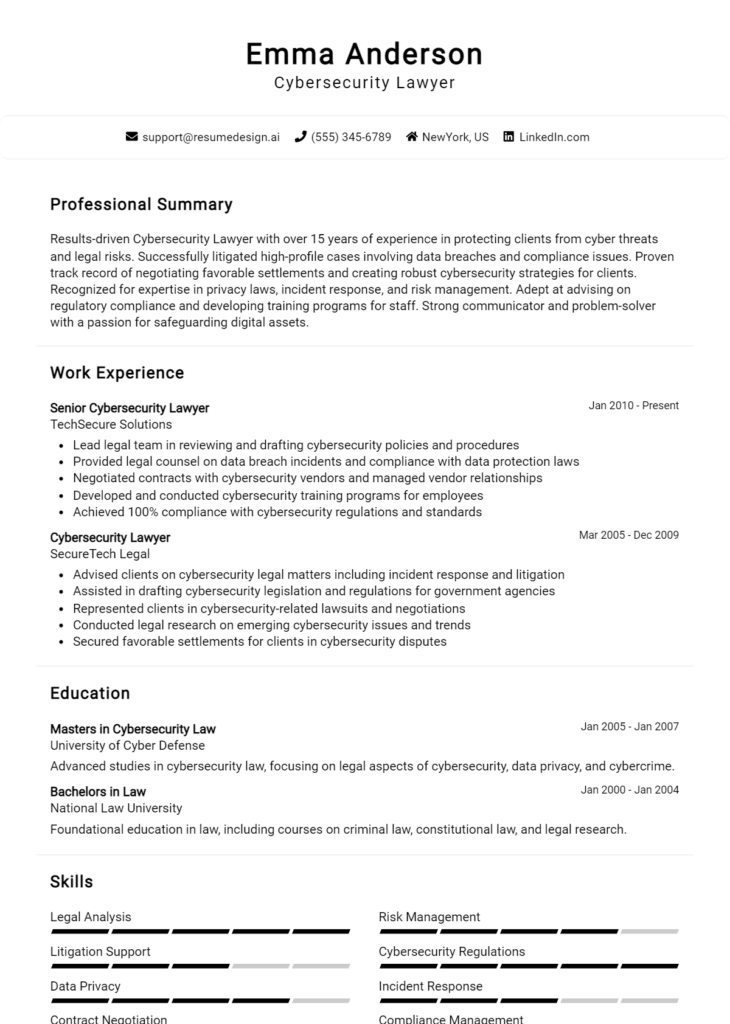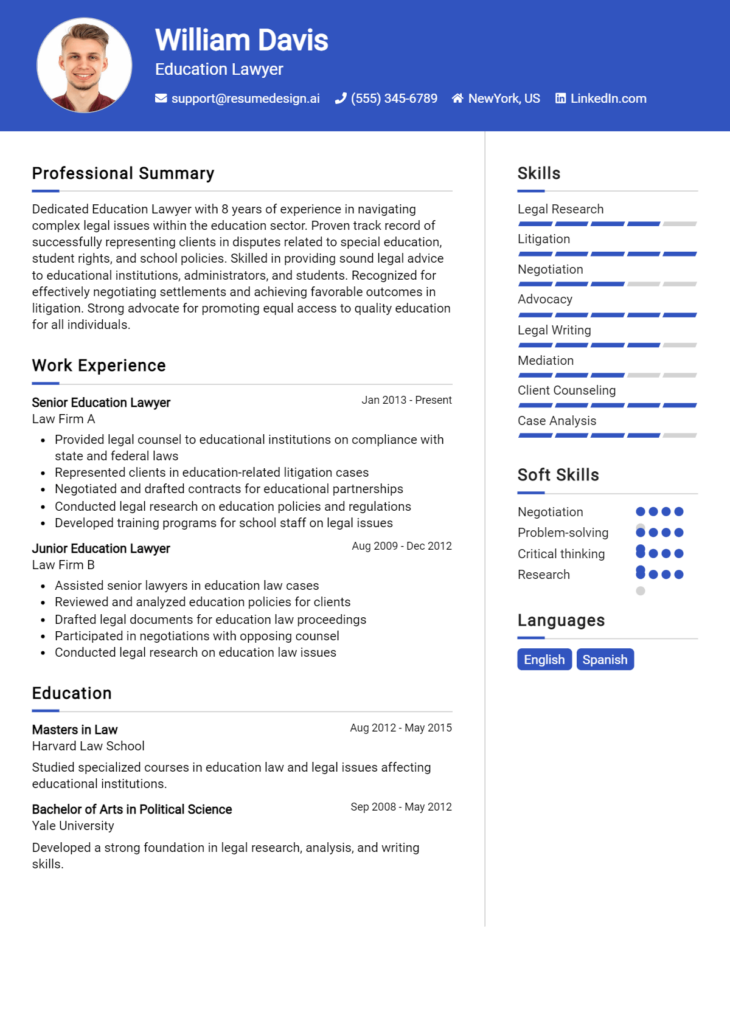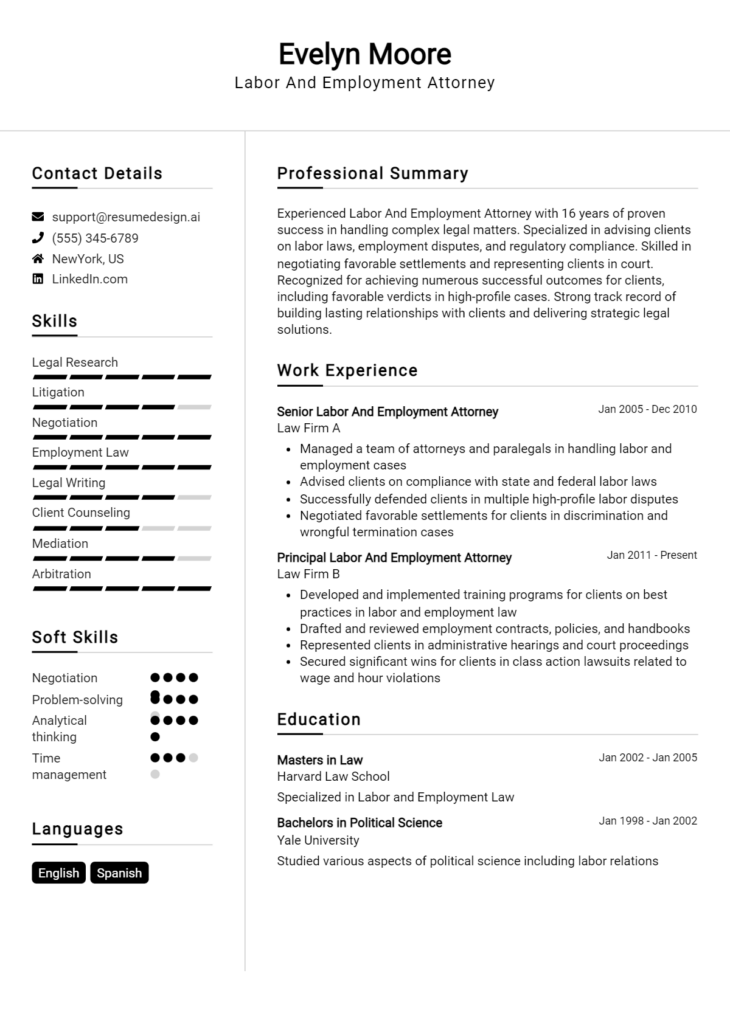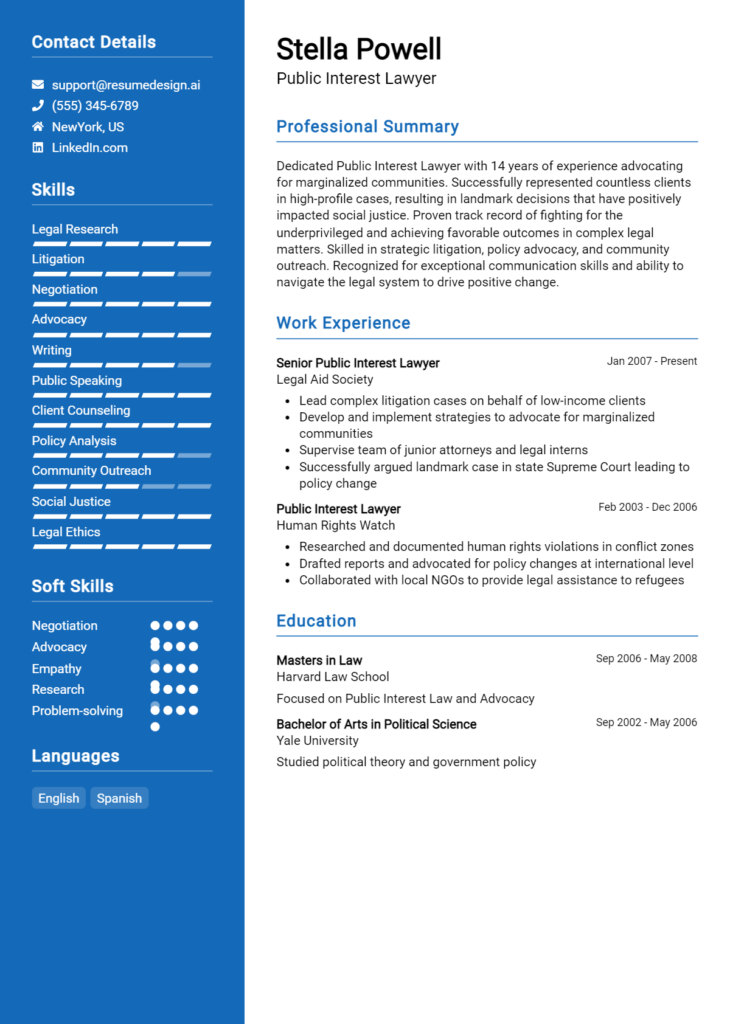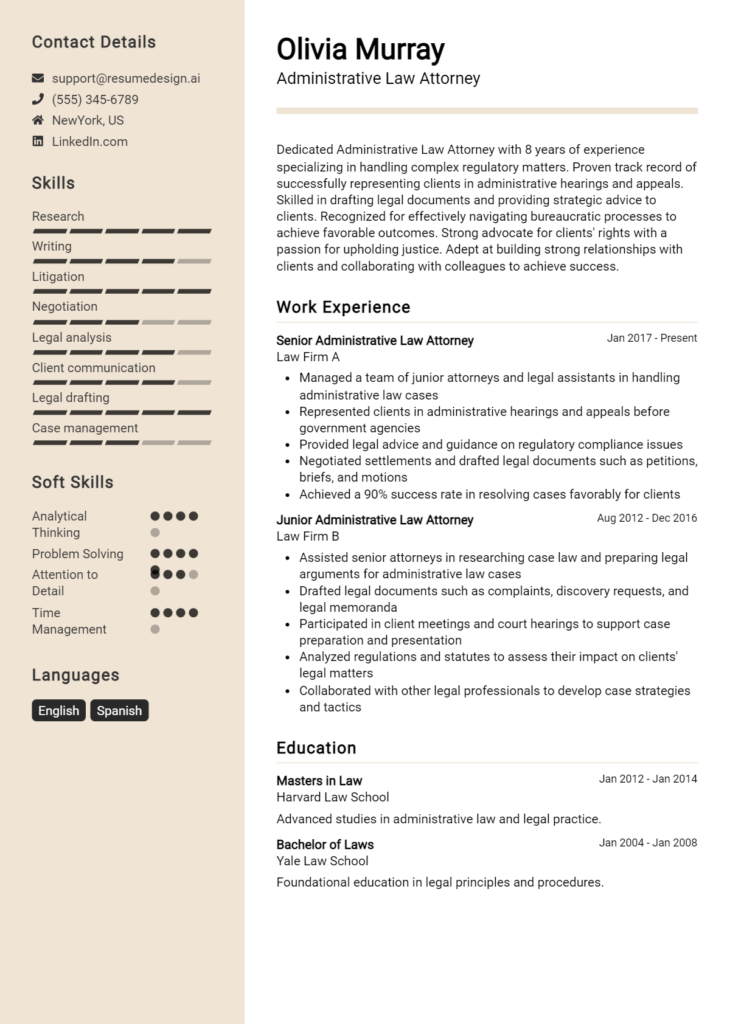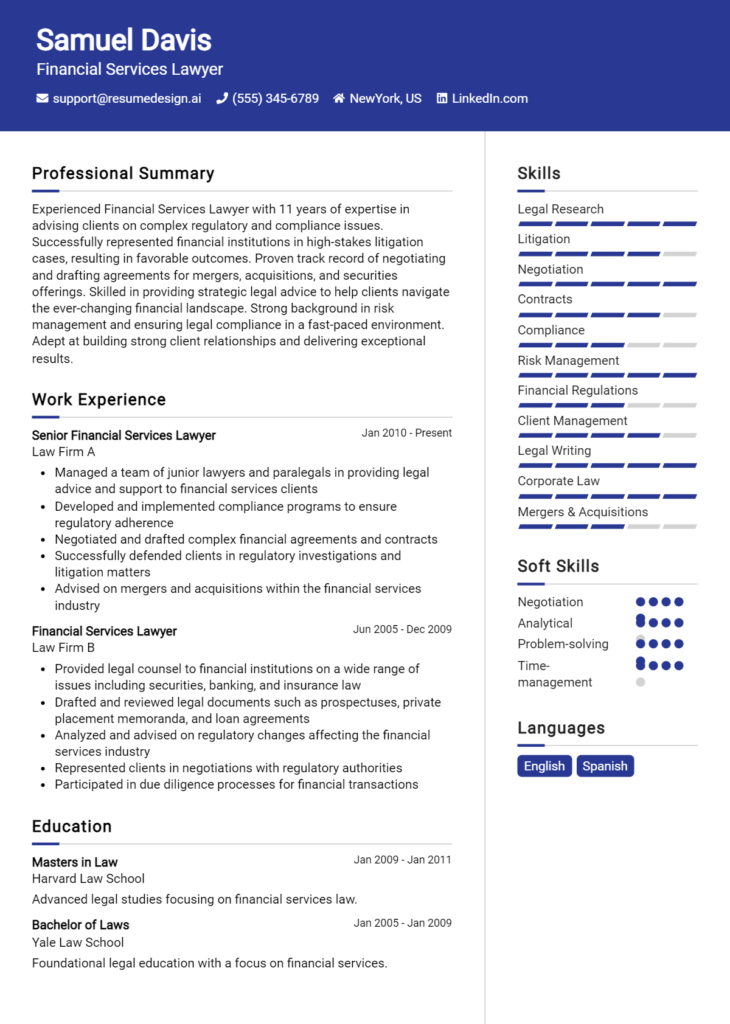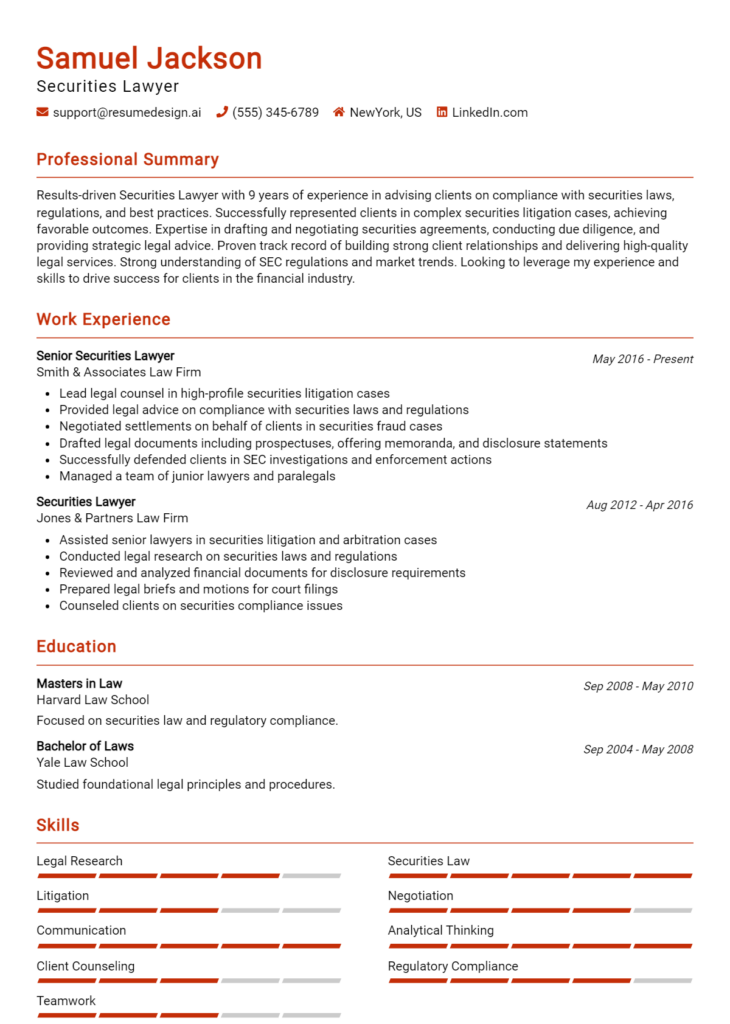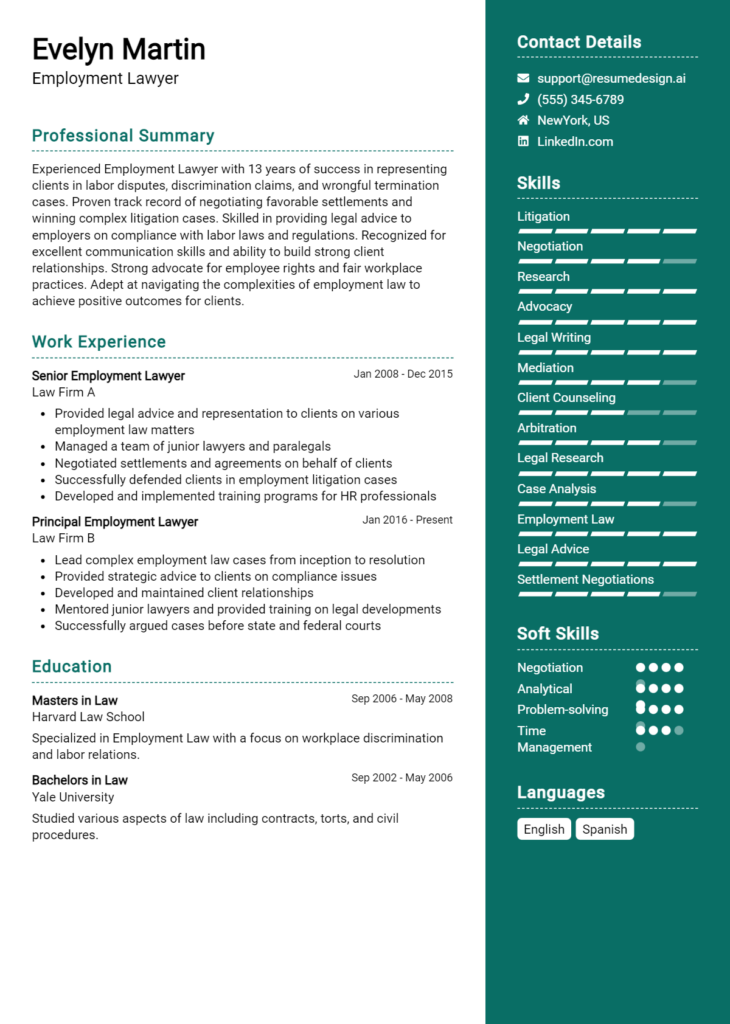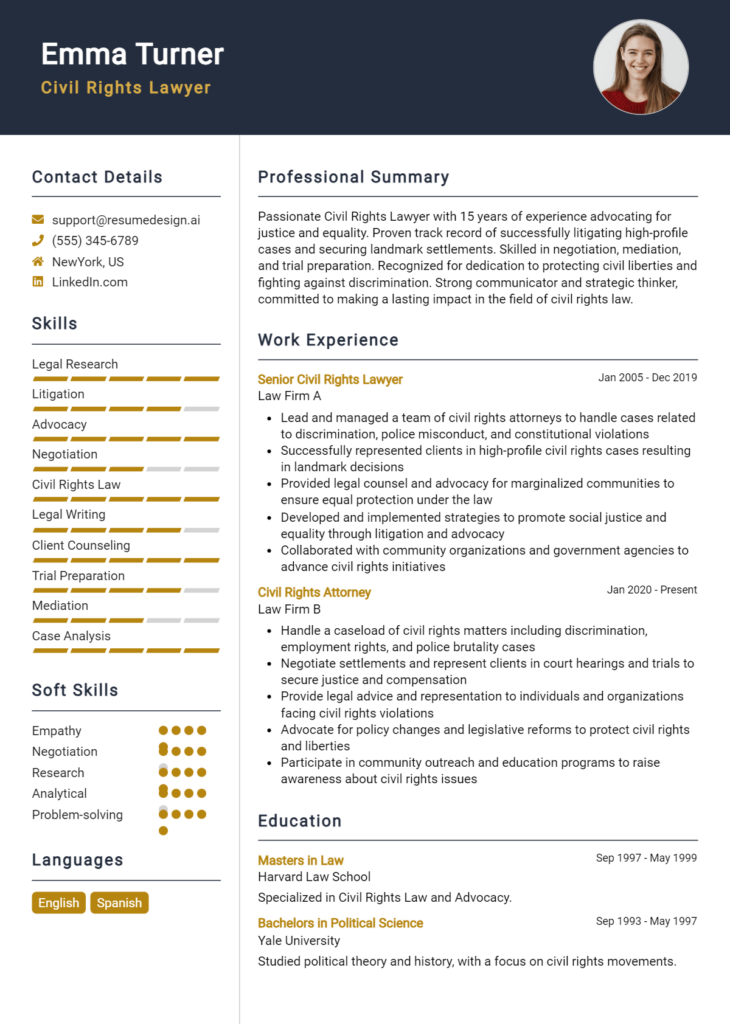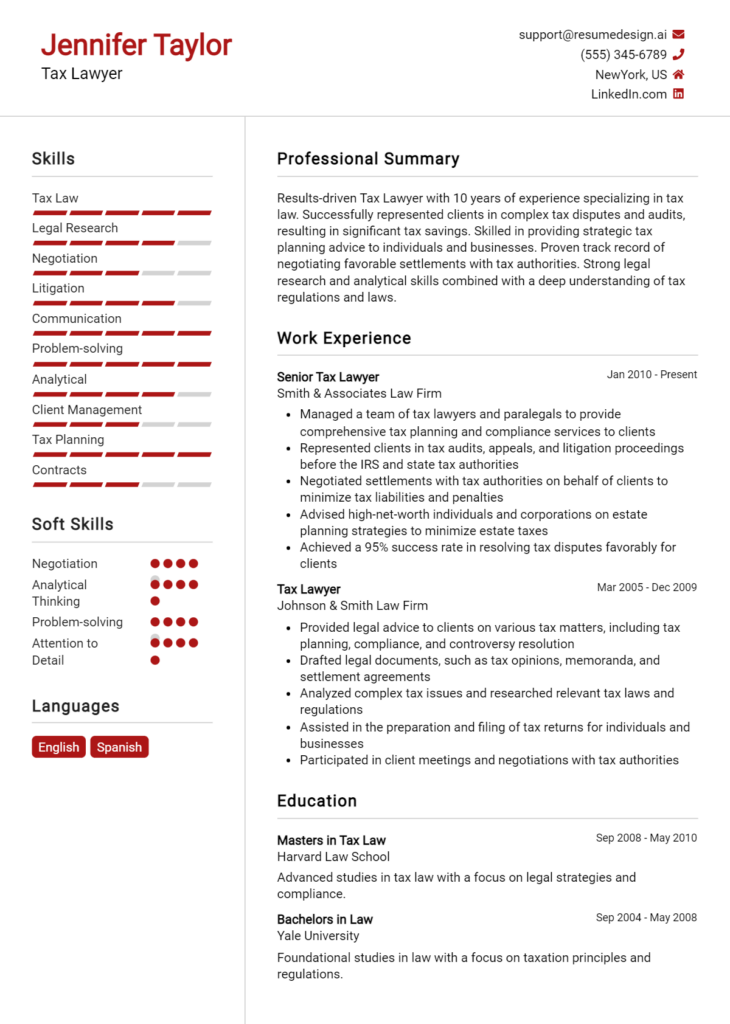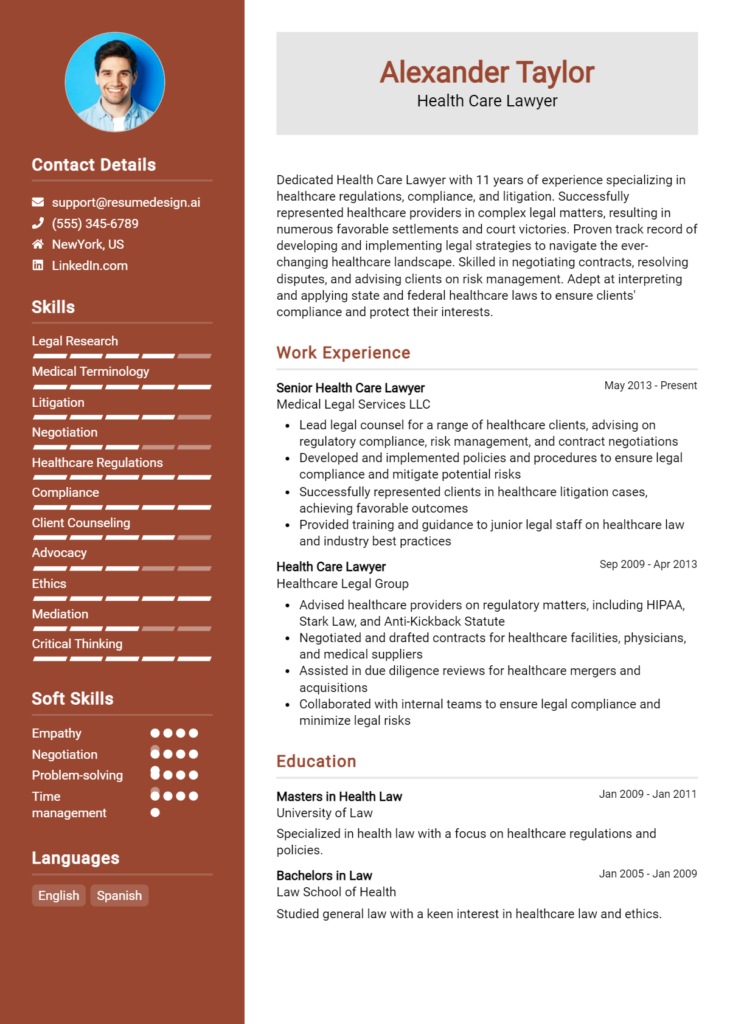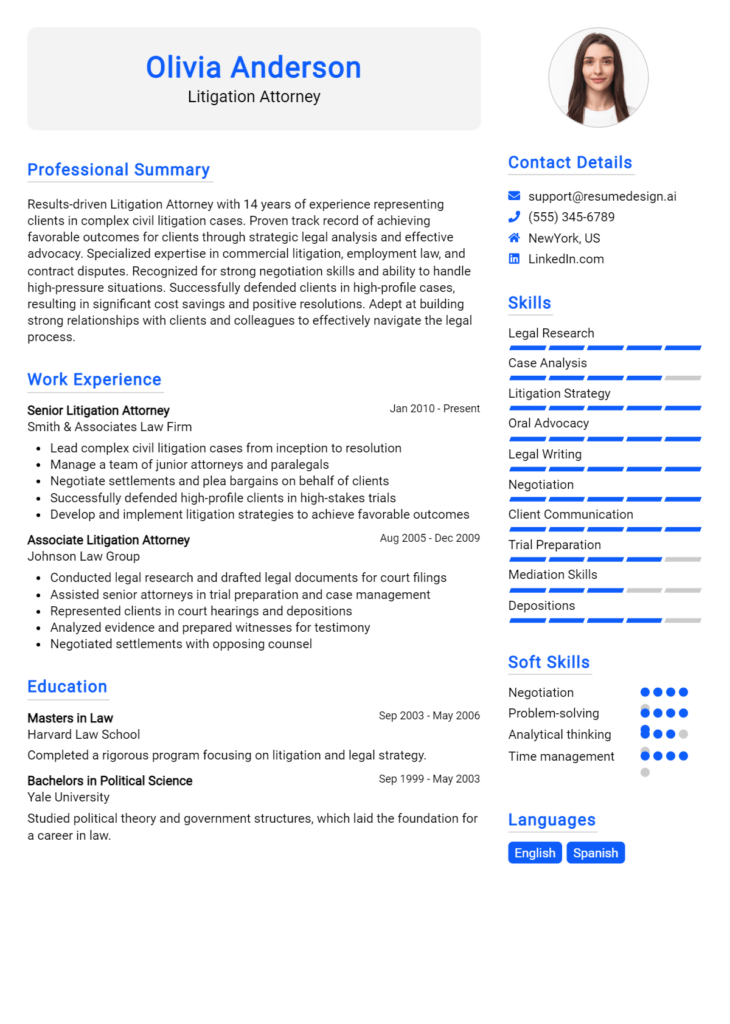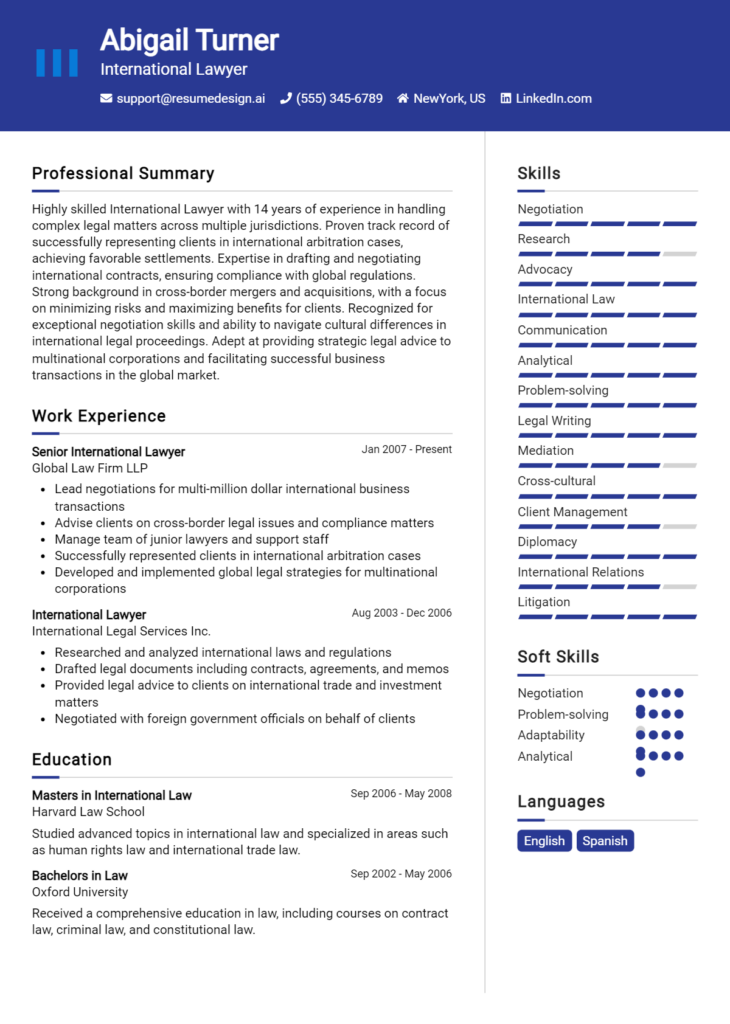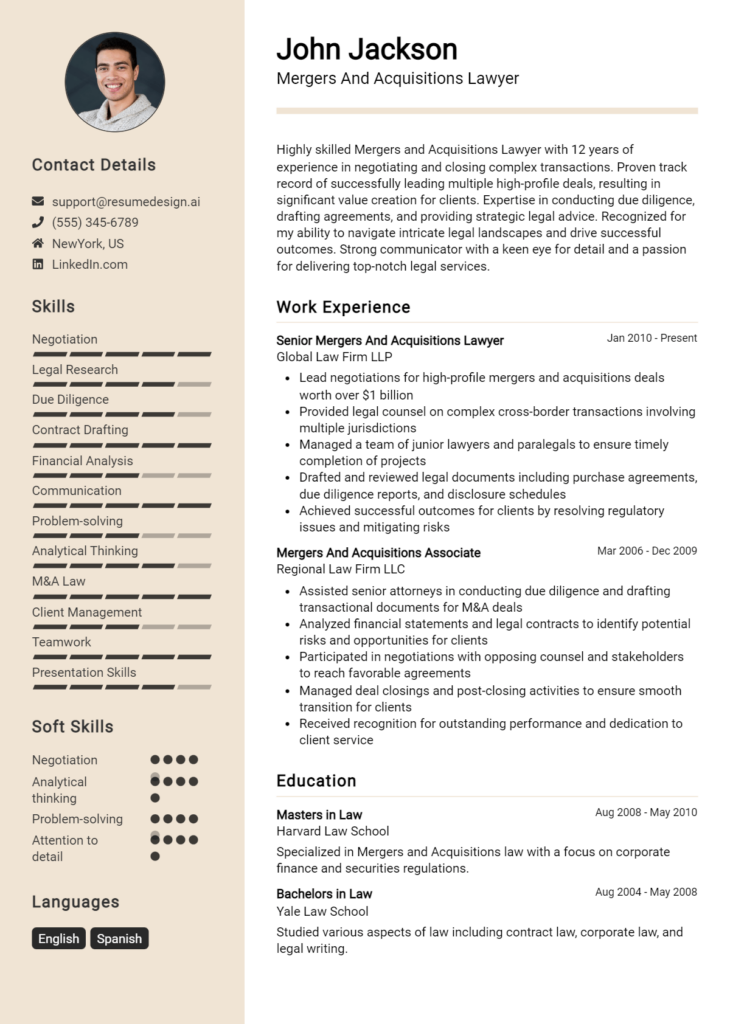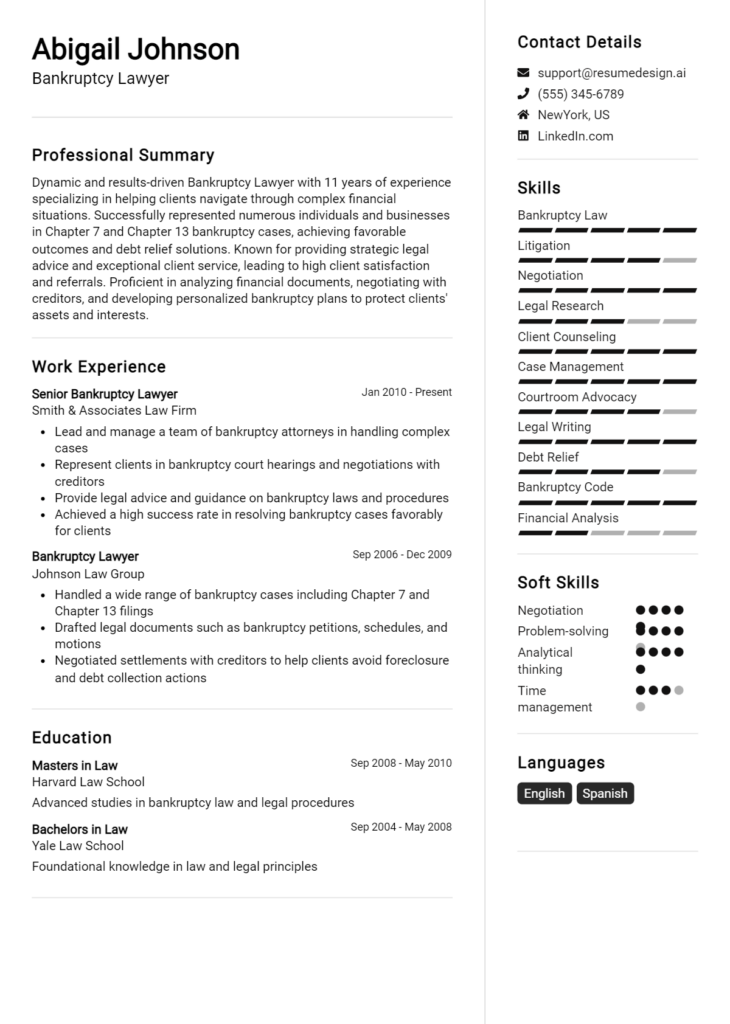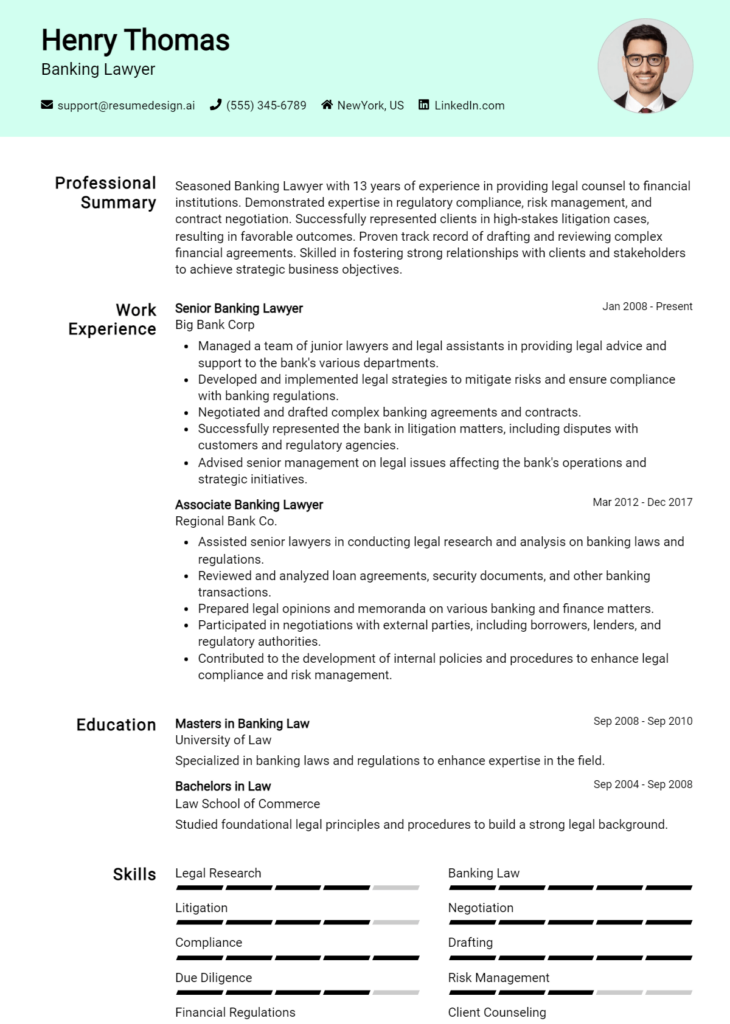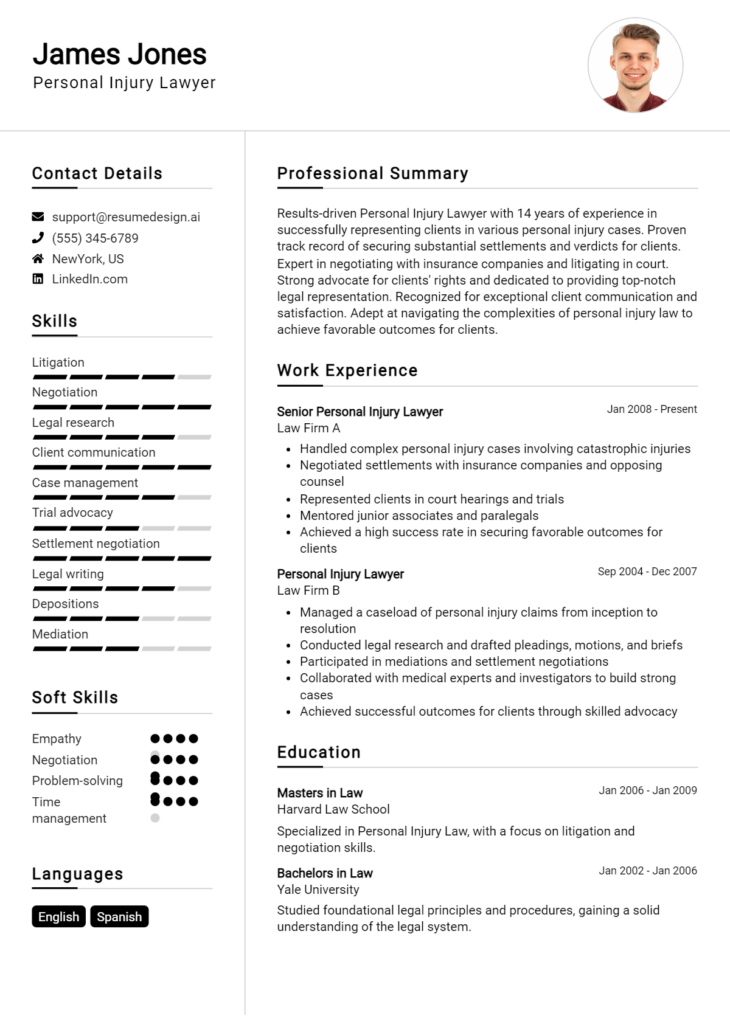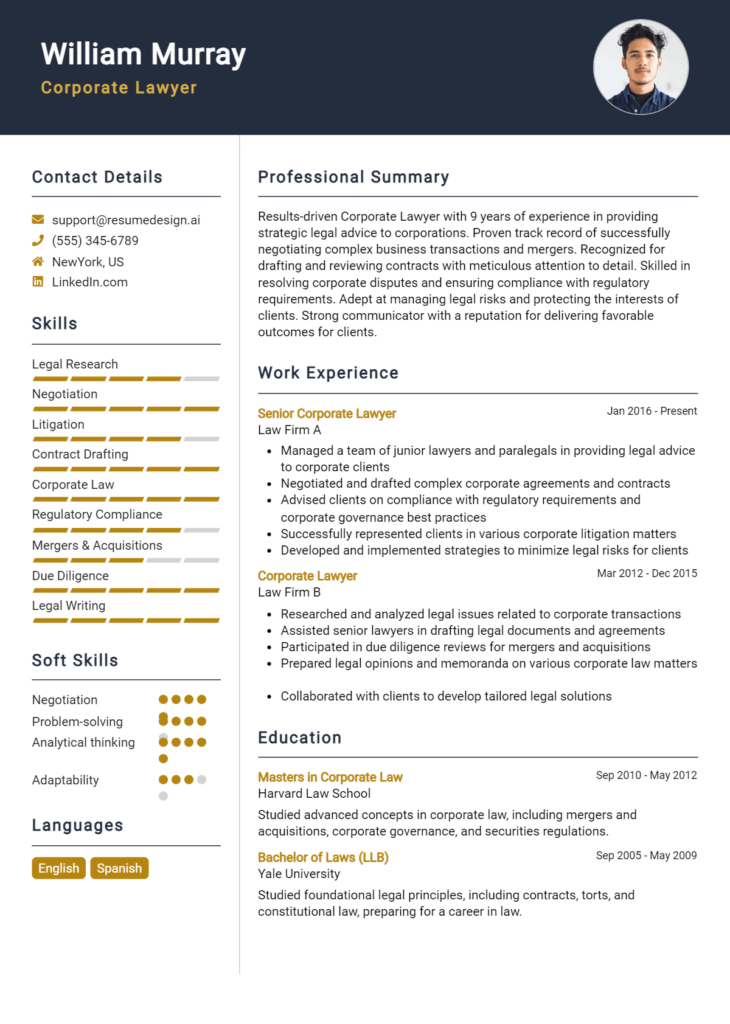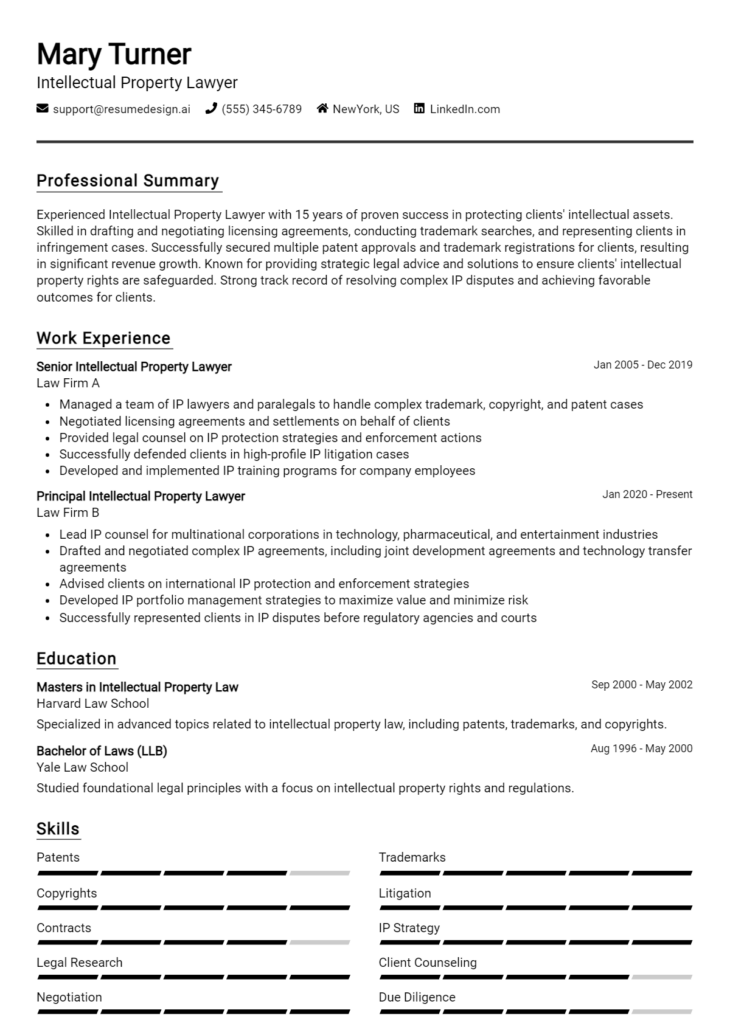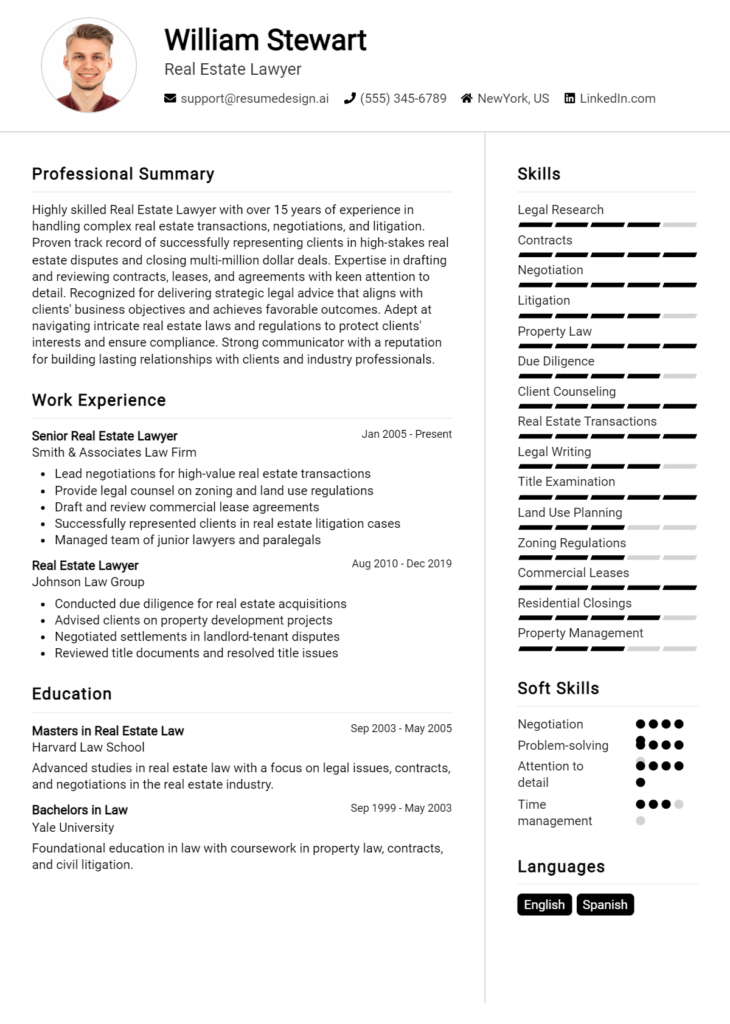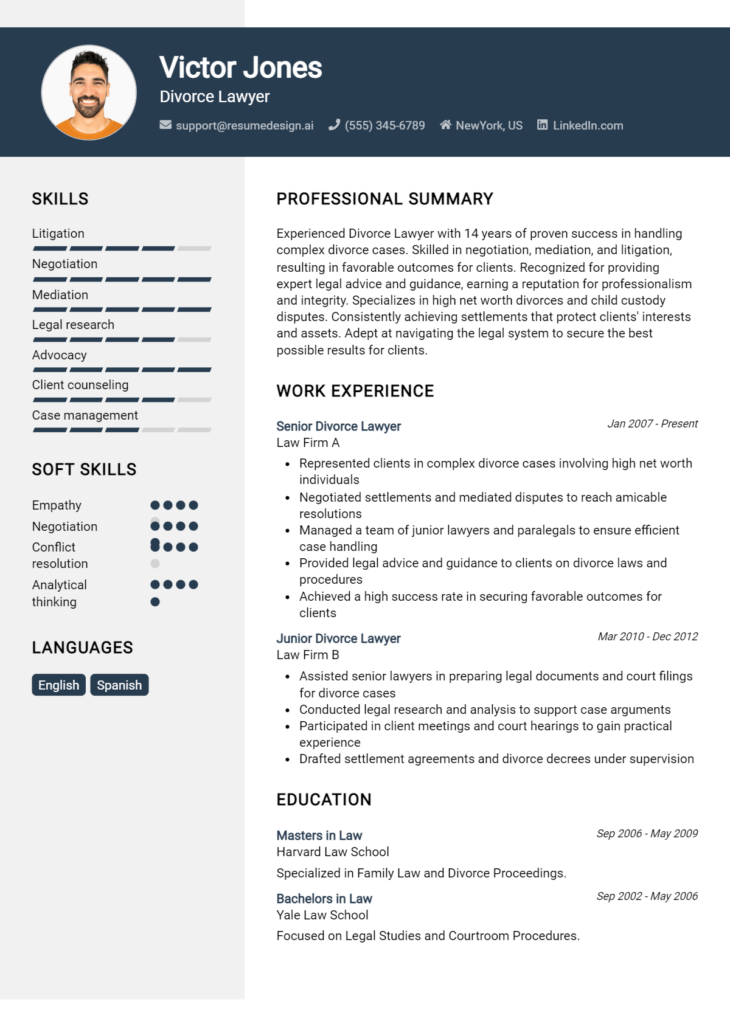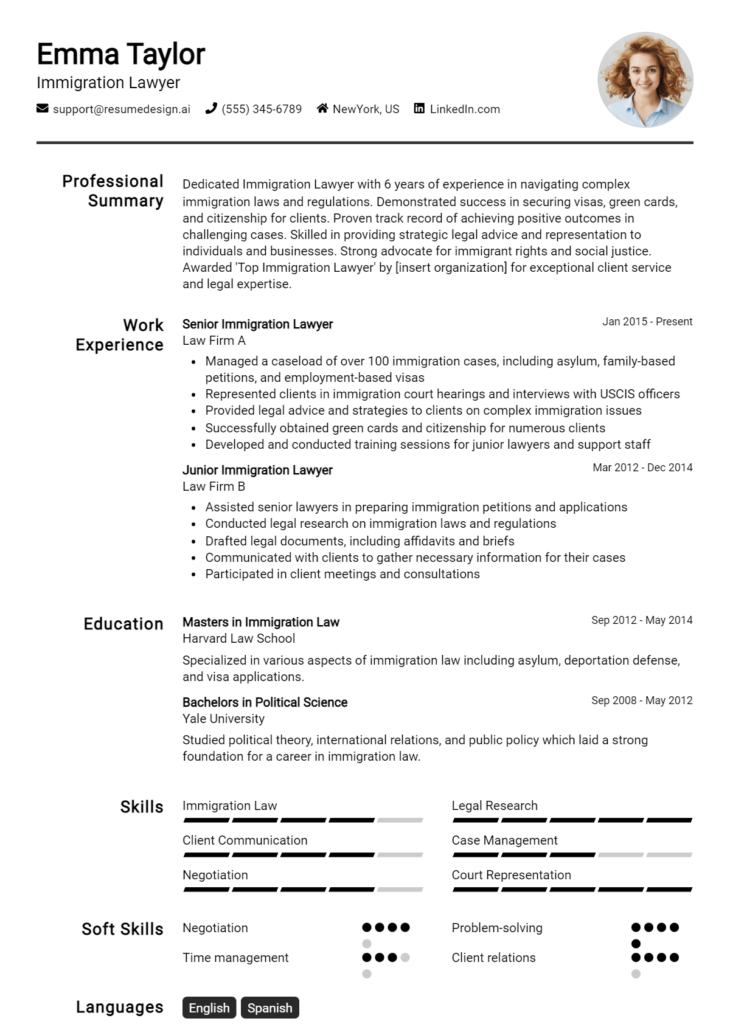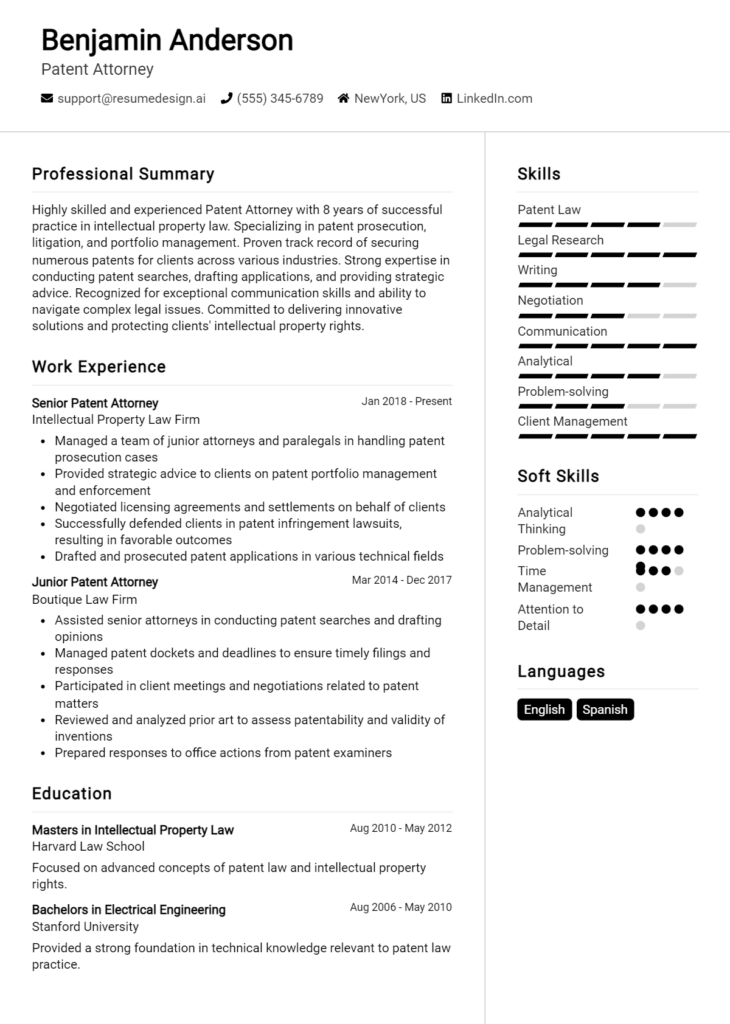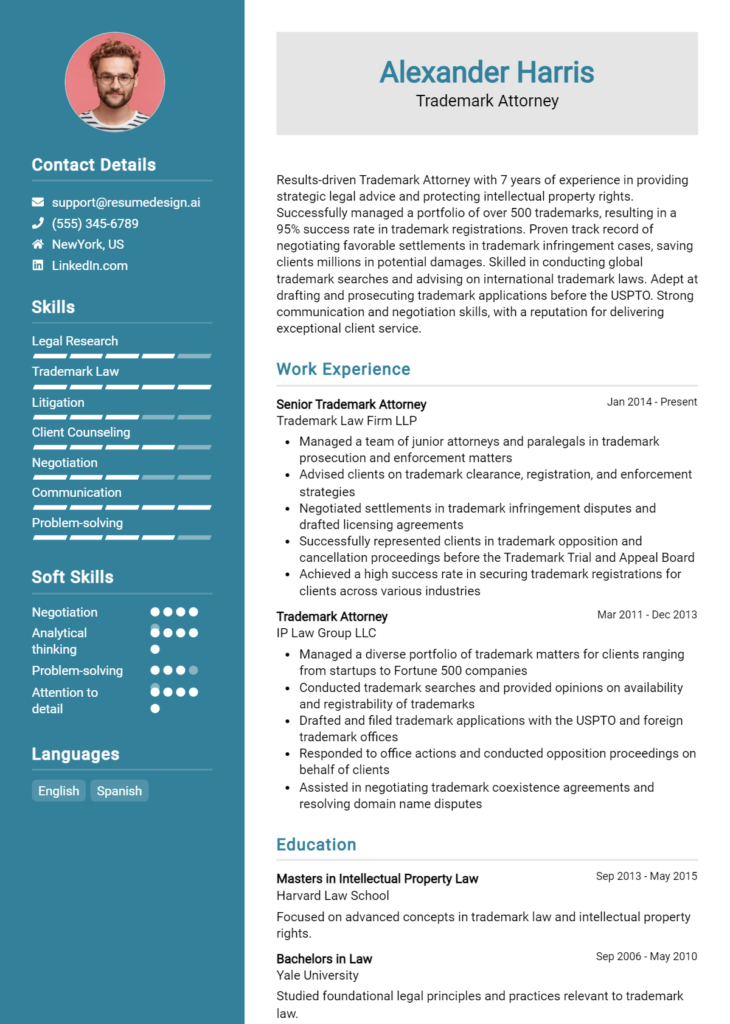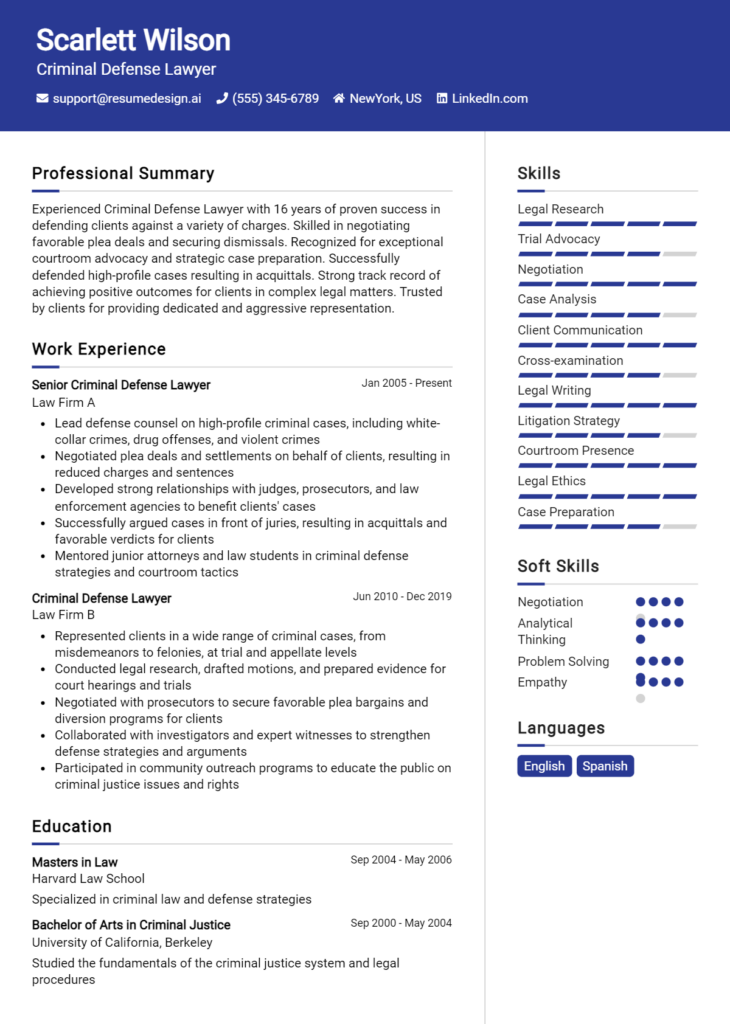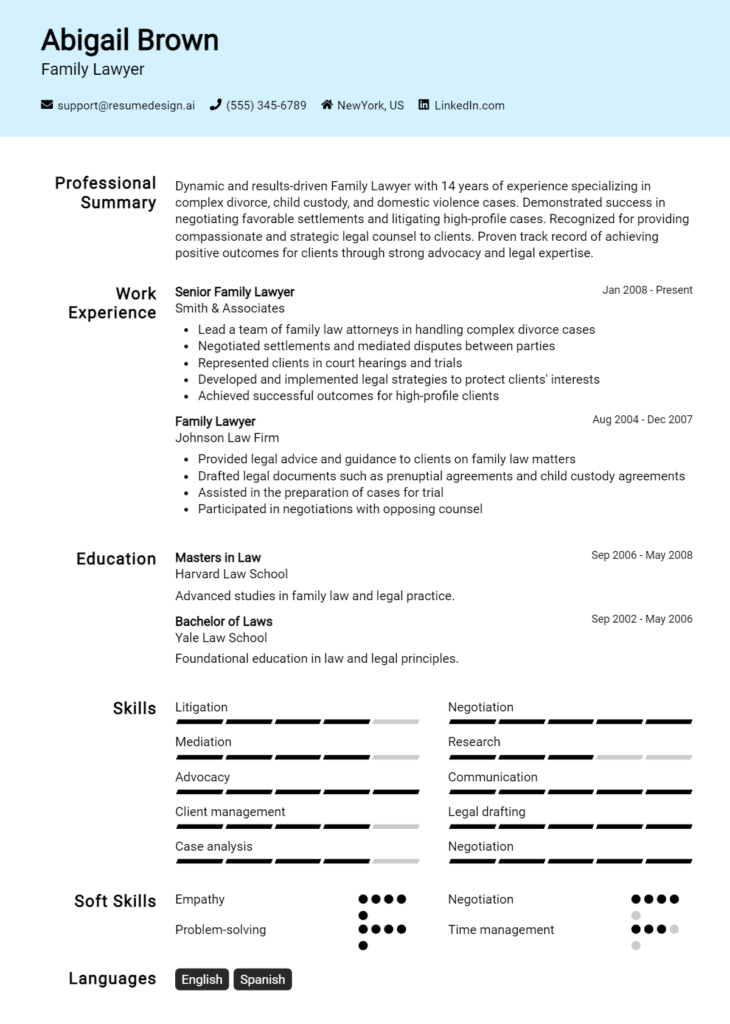Data Privacy Lawyer Core Responsibilities
A Data Privacy Lawyer plays a crucial role in navigating the complex landscape of data protection laws, ensuring compliance across various departments such as IT, HR, and marketing. Key responsibilities include advising on data handling practices, drafting privacy policies, and conducting risk assessments. Essential skills encompass technical knowledge of data systems, operational insight, and effective problem-solving abilities. These competencies are vital for aligning data practices with organizational goals, and a well-structured resume can effectively showcase these qualifications to potential employers.
Common Responsibilities Listed on Data Privacy Lawyer Resume
- Advising clients on compliance with data protection regulations.
- Drafting and reviewing privacy policies and contracts.
- Conducting data protection impact assessments.
- Providing training on data privacy issues to staff.
- Responding to data breaches and managing incident responses.
- Monitoring changes in data protection laws and regulations.
- Collaborating with IT and security teams on data management practices.
- Assisting in the development of data retention and deletion policies.
- Representing clients in regulatory investigations and disputes.
- Developing strategies for international data transfers.
- Conducting audits of data privacy practices and compliance.
- Consulting on the legal implications of new technologies.
High-Level Resume Tips for Data Privacy Lawyer Professionals
In today's competitive job market, a well-crafted resume is essential for Data Privacy Lawyer professionals looking to make a lasting impression on potential employers. As the first point of contact, your resume serves as a vital marketing tool that should effectively showcase not only your legal expertise but also your achievements in the ever-evolving field of data privacy. A strong resume highlights your unique skills and experiences, demonstrating to hiring managers that you are the ideal candidate for the job. This guide will provide practical and actionable resume tips specifically tailored for Data Privacy Lawyer professionals, ensuring you stand out in a crowded field.
Top Resume Tips for Data Privacy Lawyer Professionals
- Tailor your resume to the specific job description by aligning your skills and experiences with the requirements outlined in the posting.
- Highlight relevant legal experience, including any roles that specifically dealt with data privacy laws, compliance, and regulations.
- Quantify your achievements where possible, such as the number of successful cases handled, compliance audits completed, or data breach incidents managed.
- Include industry-specific skills, such as knowledge of GDPR, CCPA, and other data protection regulations that are crucial in today's legal landscape.
- Showcase your ability to draft and negotiate privacy policies, data processing agreements, and other legal documents pertinent to data protection.
- List relevant certifications and training, such as Certified Information Privacy Professional (CIPP), to demonstrate your commitment to professional development.
- Utilize strong action verbs to describe your responsibilities and accomplishments, making your contributions clear and impactful.
- Incorporate keywords from the job description throughout your resume to help it pass through Applicant Tracking Systems (ATS).
- Maintain a clean, professional format that allows for easy readability and highlights your key qualifications effectively.
- Include a brief summary or objective statement at the top of your resume that encapsulates your expertise in data privacy law and your career goals.
By implementing these tips, you can significantly enhance your resume's effectiveness and increase your chances of landing a job in the Data Privacy Lawyer field. A well-structured and targeted resume not only showcases your qualifications but also conveys your understanding of the complexities of data privacy law, making you a more attractive candidate to potential employers.
Why Resume Headlines & Titles are Important for Data Privacy Lawyer
In the competitive field of data privacy law, a well-crafted resume headline or title serves as a powerful tool to capture the attention of hiring managers. A strong headline encapsulates a candidate's key qualifications and expertise in a concise, impactful manner, providing a snapshot of their professional identity. This essential element not only helps differentiate a candidate from the crowd but also sets the tone for the rest of the resume. By being relevant and directly related to the job being applied for, a compelling headline can significantly enhance a candidate's chances of making a memorable first impression.
Best Practices for Crafting Resume Headlines for Data Privacy Lawyer
- Keep it concise: Aim for a brief, impactful statement that is easy to read at a glance.
- Be specific: Tailor the headline to reflect the specific role of a Data Privacy Lawyer, incorporating relevant keywords.
- Highlight key skills: Focus on the most important qualifications or skills that set you apart as a candidate.
- Showcase accomplishments: If possible, include notable achievements that demonstrate your expertise in data privacy law.
- Use active language: Employ verbs and strong adjectives to convey confidence and capability.
- Avoid jargon: Ensure the language used is accessible and avoids overly technical terms that may confuse the reader.
- Match the job description: Align your headline with the specific requirements and language of the job posting.
- Stay professional: Maintain a formal tone that reflects the seriousness of the legal profession.
Example Resume Headlines for Data Privacy Lawyer
Strong Resume Headlines
Results-Driven Data Privacy Lawyer Specializing in GDPR Compliance and Risk Management
Experienced Legal Counsel with a Proven Track Record in Data Protection Strategies
Data Privacy Expert with 10+ Years of Experience in Navigating Complex Legal Frameworks
Weak Resume Headlines
Lawyer Looking for Opportunities
Legal Professional with Experience
The strong headlines are effective because they immediately convey specific strengths and relevant experience, making it clear what the candidate can bring to the role of a Data Privacy Lawyer. They incorporate essential keywords and highlight areas of expertise, which makes them stand out to hiring managers. Conversely, the weak headlines fail to impress due to their vagueness and lack of specificity; they do not provide any meaningful insight into the candidate’s qualifications, leaving hiring managers uninterested and uninformed about the candidate’s capabilities.
Writing an Exceptional Data Privacy Lawyer Resume Summary
A well-crafted resume summary is essential for a Data Privacy Lawyer as it serves as the first impression for hiring managers. In a highly specialized field where expertise in data protection regulations and compliance is paramount, a strong summary quickly captures attention by succinctly showcasing key skills, relevant experience, and noteworthy accomplishments. A concise and impactful summary tailored to the specific job being applied for can significantly enhance a candidate's visibility, making it easier for hiring managers to identify their suitability for the role. A compelling summary acts as a powerful tool to set the tone for the rest of the resume, highlighting the candidate's value proposition in the competitive legal landscape.
Best Practices for Writing a Data Privacy Lawyer Resume Summary
- Quantify Achievements: Use numbers and metrics to demonstrate the impact of your work, such as the number of successful compliance audits or the percentage of risk reduction achieved.
- Focus on Skills: Highlight specific skills that are relevant to data privacy law, including knowledge of GDPR, CCPA, or other regulations, as well as technical skills related to data management.
- Tailor to the Job Description: Customize your summary to align with the requirements and responsibilities outlined in the job listing, ensuring you address the employer's specific needs.
- Be Concise: Keep the summary brief—ideally 2-4 sentences—while still conveying the essential information that makes you a strong candidate.
- Use Action-Oriented Language: Employ strong verbs to convey your achievements and responsibilities, making your contributions clear and impactful.
- Showcase Relevant Experience: Include information about your background that directly relates to the role, such as past positions held or notable cases handled in data privacy law.
- Highlight Professional Development: Mention any certifications, training, or continuing education that enhances your qualifications in the field of data privacy.
- Convey Passion for Data Privacy: Briefly express your commitment to protecting data and privacy rights, which can resonate with employers who value dedication to the field.
Example Data Privacy Lawyer Resume Summaries
Strong Resume Summaries
Results-driven Data Privacy Lawyer with over 8 years of experience in navigating complex regulatory landscapes and achieving 95% compliance rates for clients across various industries. Expert in GDPR and CCPA regulations, providing strategic legal advice that mitigated data breach risks by 40% in the last fiscal year.
Dedicated legal professional with a proven track record in data privacy law, successfully led a team in conducting comprehensive data audits that identified potential compliance gaps, resulting in a 30% reduction in legal exposure for a Fortune 500 firm. Proficient in drafting privacy policies aligned with current legislation.
Accomplished Data Privacy Lawyer with extensive experience advising multinational corporations on data protection strategies. Spearheaded a data compliance initiative that reduced incidents of non-compliance by 50%, enhancing corporate reputation and trust among stakeholders.
Weak Resume Summaries
Experienced lawyer looking for a position in data privacy law. I have worked on various legal matters and am familiar with privacy regulations.
Data Privacy Lawyer with a good understanding of laws and regulations. I am seeking a challenging role to utilize my legal skills in a reputable firm.
The strength of the examples lies in their specificity and quantifiable achievements, clearly illustrating the candidates' impact and expertise in data privacy law. In contrast, the weak summaries lack detail and fail to convey measurable outcomes or relevant skills, making them less engaging and informative. Strong summaries provide a clear narrative of the candidate's value, while weak ones leave hiring managers with little understanding of the candidate's qualifications.
Work Experience Section for Data Privacy Lawyer Resume
The work experience section of a Data Privacy Lawyer resume is crucial as it serves as a comprehensive showcase of the candidate's technical skills, leadership capabilities, and their ability to produce high-quality outcomes in the field of data privacy law. This section not only highlights specific legal expertise and knowledge of regulations such as GDPR and CCPA but also emphasizes the candidate's experience in managing teams and projects, thus demonstrating their capacity for collaboration and strategic thinking. Quantifying achievements—like the number of successful compliance audits or the percentage of data breach incidents mitigated—further strengthens this section, aligning the candidate's experiences with industry standards and making them stand out to potential employers.
Best Practices for Data Privacy Lawyer Work Experience
- Clearly outline specific roles and responsibilities in previous positions to provide context.
- Quantify achievements with metrics, such as the number of clients served or compliance rates achieved.
- Highlight technical skills relevant to data privacy, such as expertise in data protection regulations and risk assessments.
- Include instances of leadership, such as managing a team or leading a project, to demonstrate managerial capabilities.
- Showcase collaboration with cross-functional teams to illustrate the ability to work effectively with others.
- Tailor the experiences to align with the specific requirements of the job being applied for.
- Use action verbs to convey proactive involvement in achieving results.
- Incorporate relevant certifications or ongoing professional development in data privacy law.
Example Work Experiences for Data Privacy Lawyer
Strong Experiences
- Successfully led a team of 5 in conducting comprehensive data protection impact assessments for over 20 clients, resulting in a 30% reduction in compliance risks.
- Implemented a data governance framework that improved data handling processes across the organization, achieving a 95% compliance rate with GDPR within 6 months.
- Developed and delivered training programs on data privacy laws to over 100 employees, enhancing overall company awareness and reducing potential data breaches by 40%.
- Negotiated and drafted data processing agreements that safeguarded client data and reduced liability exposure by an estimated $2 million annually.
Weak Experiences
- Assisted in various legal matters related to data privacy.
- Worked on compliance issues and participated in meetings with clients.
- Helped to review contracts related to data protection.
- Engaged in general research on data privacy regulations.
The examples listed as strong experiences effectively demonstrate quantifiable outcomes, technical leadership, and collaboration, making them compelling indicators of the candidate's capabilities. In contrast, the weak experiences are vague and lack specific achievements or context, failing to convey the candidate's impact or expertise in data privacy law. By focusing on concrete accomplishments and detailed responsibilities, candidates can significantly enhance the persuasiveness of their work experience section.
Education and Certifications Section for Data Privacy Lawyer Resume
The education and certifications section of a Data Privacy Lawyer resume is crucial as it showcases the candidate's academic background and commitment to the legal and data privacy fields. This section not only highlights degrees earned from reputable institutions but also emphasizes industry-relevant certifications and any specialized training undertaken. By providing relevant coursework and credentials, candidates can significantly enhance their credibility and demonstrate their dedication to continuous learning, which is essential in a rapidly evolving field like data privacy law.
Best Practices for Data Privacy Lawyer Education and Certifications
- Include degrees from accredited institutions that focus on law, data privacy, or related fields.
- List industry-recognized certifications such as Certified Information Privacy Professional (CIPP) or Certified Information Privacy Manager (CIPM).
- Highlight relevant coursework that directly pertains to data privacy, cybersecurity, or technology law.
- Provide details on specialized training or workshops attended that focus on data protection regulations (e.g., GDPR, CCPA).
- Indicate the dates of completion for certifications to show currency in knowledge.
- Use clear and concise formatting to ensure easy readability of educational qualifications.
- Prioritize the most relevant and advanced qualifications at the top of the section.
- Regularly update this section to reflect newly acquired credentials or ongoing education initiatives.
Example Education and Certifications for Data Privacy Lawyer
Strong Examples
- Juris Doctor (JD), University of California, Berkeley School of Law, 2018
- Certified Information Privacy Professional (CIPP/US), International Association of Privacy Professionals, 2020
- Master’s in Cybersecurity and Privacy Law, George Washington University, 2019
- Relevant Coursework: Data Protection Law, Cybersecurity Law, and Intellectual Property Law
Weak Examples
- Bachelor of Arts in English Literature, University of Michigan, 2015
- Certification in Microsoft Office Suite, 2018
- Online Course: Introduction to Social Media Marketing, 2021
- High School Diploma, Local High School, 2014
The strong examples are considered relevant as they directly align with the requirements and expectations of a Data Privacy Lawyer, showcasing both legal education and specialization in data privacy. In contrast, the weak examples reflect qualifications that lack relevance to the field of data privacy law, either being outdated, unrelated, or not demonstrating a commitment to continuous professional development in this specialized area.
Top Skills & Keywords for Data Privacy Lawyer Resume
As a Data Privacy Lawyer, possessing the right skills is critical to navigating the complexities of data protection laws and regulations. The landscape of data privacy is constantly evolving, making it essential for legal professionals in this field to stay updated with the latest trends and requirements. A well-crafted resume that highlights both hard and soft skills not only showcases your qualifications but also demonstrates your ability to effectively manage legal challenges related to data privacy. Employers look for candidates who can balance technical knowledge with interpersonal abilities, ensuring that they can advocate for their clients while fostering positive relationships with stakeholders. By focusing on these essential skills, you will enhance your skills section and set yourself apart in the competitive job market.
Top Hard & Soft Skills for Data Privacy Lawyer
Soft Skills
- Strong communication skills
- Analytical thinking
- Problem-solving abilities
- Attention to detail
- Negotiation skills
- Client relationship management
- Ethical judgment
- Adaptability to change
- Research proficiency
- Team collaboration
Hard Skills
- Knowledge of data protection laws (e.g., GDPR, CCPA)
- Familiarity with compliance frameworks
- Contract drafting and review
- Data breach response planning
- Risk assessment and management
- Privacy impact assessments
- Understanding of cybersecurity principles
- Technical proficiency in data management tools
- Experience with litigation and dispute resolution
- Ability to conduct training on data privacy policies
By emphasizing these skills on your resume and integrating them into your work experience, you can effectively position yourself as a qualified candidate in the field of data privacy law.
Stand Out with a Winning Data Privacy Lawyer Cover Letter
Dear [Hiring Manager's Name],
I am writing to express my interest in the Data Privacy Lawyer position at [Company Name] as advertised on [where you found the job listing]. With a robust background in data protection law and a passion for safeguarding individual privacy rights, I am eager to contribute my expertise to your esteemed legal team. My experience includes successfully navigating complex compliance frameworks such as GDPR, CCPA, and HIPAA, which has equipped me with a nuanced understanding of the challenges and opportunities in the ever-evolving landscape of data privacy.
In my previous role at [Previous Company Name], I advised clients on a range of data privacy issues, from risk assessments to incident response protocols. I played a pivotal role in developing privacy policies and training programs that not only ensured compliance but also fostered a culture of data protection within the organization. My ability to translate intricate legal concepts into actionable strategies has enabled stakeholders to make informed decisions while maintaining their commitment to privacy and data security.
I am particularly drawn to the opportunity at [Company Name] because of your dedication to innovation and ethical data practices. I admire how your organization prioritizes consumer trust and transparency, and I am enthusiastic about the prospect of contributing to initiatives that advance these principles. I am confident that my proactive approach and strong communication skills will be valuable assets in collaborating with cross-functional teams to ensure compliance and mitigate risks effectively.
Thank you for considering my application. I look forward to the possibility of discussing how my skills and experiences align with the goals of [Company Name]. I am excited about the opportunity to contribute to your team and help shape a robust data privacy strategy that not only meets legal requirements but also supports your mission of fostering trust with your clients and stakeholders.
Sincerely,
[Your Name]
[Your Contact Information]
Common Mistakes to Avoid in a Data Privacy Lawyer Resume
When crafting a resume as a Data Privacy Lawyer, it is crucial to highlight relevant experience and expertise in a clear and professional manner. However, many candidates make common mistakes that can detract from their qualifications and fail to make a strong impression on potential employers. By avoiding these pitfalls, you can ensure your resume effectively showcases your skills and sets you apart in a competitive field.
Neglecting Specificity: Failing to include specific data privacy laws or regulations you have worked with can leave your expertise unclear. Make sure to mention relevant legislation such as GDPR, CCPA, or HIPAA.
Overloading with Jargon: Using excessive legal jargon can make your resume difficult to read. Strive for clarity and ensure that your qualifications are easily understood by both legal and non-legal professionals.
Lack of Quantifiable Achievements: Not providing metrics or quantifiable results from your previous roles can weaken your resume. Whenever possible, include figures that demonstrate your impact, such as the number of compliance projects completed or risk assessments conducted.
Ignoring Tailoring for Job Descriptions: Submitting a generic resume without tailoring it to the specific job description can be a missed opportunity. Highlight experience and skills that directly align with the requirements listed by the employer.
Omitting Continuing Education: Data privacy laws are constantly evolving, and neglecting to mention relevant continuing education, certifications, or workshops can suggest a lack of current knowledge. Ensure to include any recent training or certifications related to data privacy.
Inconsistent Formatting: Poor formatting can make your resume appear unprofessional. Stick to a consistent font, size, and style throughout the document to enhance readability.
Including Irrelevant Experience: Listing unrelated work experience can dilute your resume’s focus. Concentrate on experiences that directly relate to data privacy law to strengthen your application.
Neglecting a Professional Summary: Skipping a compelling professional summary at the beginning of your resume can be a missed opportunity to grab attention. A well-crafted summary can succinctly convey your core competencies and what you bring to the table as a Data Privacy Lawyer.
Conclusion
As a Data Privacy Lawyer, your role is becoming increasingly vital in today's digitally-driven world. This position involves navigating complex legal frameworks to protect individuals' personal information while ensuring compliance with various data protection laws such as GDPR, CCPA, and others. Your expertise in advising clients on data handling practices, conducting privacy impact assessments, and responding to data breaches is crucial for fostering trust in an organization's data management processes.
In addition to legal knowledge, effective communication skills, attention to detail, and an understanding of technology trends are essential attributes for success in this field. Staying updated with the ever-evolving landscape of data privacy laws and regulations will help you provide invaluable guidance to your clients.
In conclusion, as you prepare or refine your resume for a Data Privacy Lawyer position, it's important to highlight your relevant experience and skills. Consider using helpful resources like resume templates, a resume builder, and resume examples to create a compelling document. Don’t forget the power of a well-crafted cover letter – check out cover letter templates to ensure you make a strong impression. Take action today by reviewing and updating your resume to position yourself effectively in the competitive legal field of data privacy.

